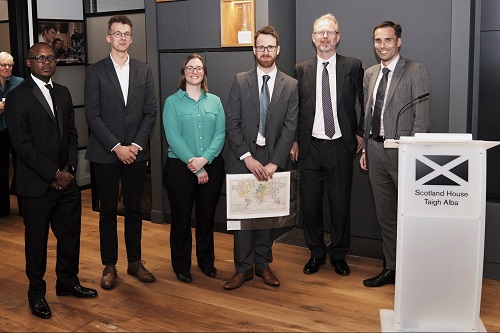
The UK Government has released its Geography Profession Strategy 2023–36, which outlines plans to boost the discipline across the public sector.
Writing in the foreword of the Strategy document, David Wood, Head of the UK’s Government Geography Profession (GGP), said the Strategy is a plan for supporting “geographical decision making across the public sector by supporting and growing a diverse community of geographers and increasing the impact and influence of the discipline in government and beyond”.
“Our expertise covers the full breadth of our discipline, including physical and social science aspects of geography, and our members are located across the UK. Our membership includes people involved in analytical, scientific, policy and operational delivery roles,” Wood added.
The GGP, which was launched in 2018, has built a community of experts across public sector organisations to support geographers in their work. The GGP’s vision statement is to “create and grow a high-profile, proud and effective geography profession that attracts fresh talent and has a secure place at the heart of decision making”.
The Strategy outlines three pillars that will enable the GGP to achieve that vision.
Pillar 1 — Maximise impact
Pillar 1 involves development of an environment in which geographers can have maximum impact across the government and public sector. The Strategy states that this pillar “will be delivered through the inclusive leadership of the Organisational and Community Heads of Profession through their work to support and raise the profile of geographers within their organisations”.
Within each of their organisations, those Heads of Profession will:
- Encourage and promote GGP membership across their organisation.
- Develop an inclusive and diverse local community of geographers, providing them with development opportunities through volunteering and contributing to the management of GGP initiatives.
- Share geo best practice across the organisation through local initiatives.
- Share activities and lessons learned from initiatives to the GGP leadership.
- Contribute to wider conversations as part of organisational governance alongside other professions.
Pillar 2 — Promote professionalism
Pillar 2 involves “professionalising” and progressing the use and applications of geography across the government and public sector. This pillar will involve:
- Implementing a skills and training offer for GGP members. This will include working with partner organisations and the wider Analysis Function (see below).
- Developing a GGP mentor program.
- Identifying mechanisms for geography to have the same recognition as other profession within the Analysis Function.
- Promoting the opportunity for members to gain professional accreditation.
- Recognising and celebrating the work of GGP members through annual Geography in Government awards.
- Identifying gaps in geographical guidance across the public sector.
- Ensuring that other guidance across the analytical function incorporates geo principles.
Pillar 3 — Increase diversity
The third pillar of the Strategy will involve “growing a diverse and inclusive community of geographers within the profession and public sector”. To achieve that aim, this pillar will:
- Develop and update resources that can be used for outreach to the education sector.
- Engage with existing outreach schemes and networks.
- Monitor wider public sector entry routes and ensure geography is represented.
- Work with and across government professions and networks to ensure the digital approach of the GGP is joined up and consistent.
- Engage with networks to improve the equality, diversity and inclusion within the GGP.
Spatial analytics skills
The UK’s Geospatial Commission — established in 2018 and responsible for setting the UK’s geospatial strategy for delivering improved public services — is the departmental sponsor of the GGP, while the GGP itself is one of seven professions that make up the Analysis Function, the goal of which is to be the go-to hub for best practice research and analysis services within the Government.

“Geography, a discipline distinctive for its spatial analytical skills and tools, is key to this understanding,” said Wood. “It provides an important bridge between different teams, expertise and organisations — helping to forge holistic considerations of places and communities in analysis, policy, and delivery.”
“Since our creation in 2018 we have become an established stand-alone profession, our membership has grown, we have dedicated resources for the profession and have developed an offer for all our members, such as our annual awards and annual conference. “These are areas that we will continue to develop, but there is a lot more that we want to do, which you will see in this strategy.”







